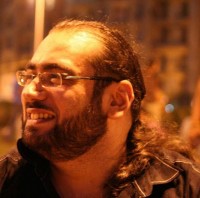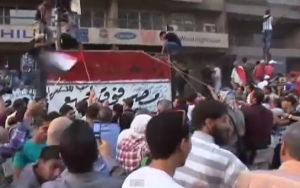Timeline: Egyptian Journalists Censored in September
by Caitlyn Christensen / October 12, 2011 / No comments
Egypt’s Supreme Military Council (SCAF) is censoring domestic newspapers, raiding television stations, and reinstating Mubarak-era emergency laws that will put journalists and civilians on trial in military courts. Hassiba Hadj Sahraoui, Amnesty International’s Deputy Director for the Middle East and North Africa, explains “[the military courts] are fundamentally unfair, as [they] deny defendants basic fair trial guarantees, including the right to proper appeal.” As the promise of the Arab Spring gives way to a tense fall, Sampsonia Way presents a timeline of SCAF’s media crackdowns in September.
September 5
Egyptian authorities detained Imad Bazzi, a Lebanese blogger, keeping him from entering Egypt.
Bazzi was deported after 10 hours of questioning. Bazzi runs the activist blog Trella.org. In June he visited Maikel Nabil Sanad in jail. A Cairo airport official told the AFP that Bazzi’s been “blacklisted” from entering Egypt.
September 10
SCAF decided to “temporarily freeze” licenses for new private satellite television stations, reported online Egyptian newspaper Al-Arabiya.net. The military council also assigned Egypt’s Investment Authority, which normally works with Egypt’s global investors, the task of taking legal measures against satellite channels that “incite violence and destabilize stability.” al Arabiya reported that the country’s Communication Minister, Osama Keikel, said the ruling did not limit press freedoms; he also urged the media to publish “accurate information.”
September 11
SCAF raided Al Jazeera’s Cairo headquarters, shutting down a live broadcast and arresting a station engineer. The engineer was released the next day.
September 14
After anti-SCAF protesters breached the Israeli Embassy’s walls on September 9, SCAF announced that it would enforce Mubarak-era emergency laws, reported Al-Masry al-Youm, an Egyptian daily. The emergency laws allow civilians and journalists to be tried in in state security courts and detained indefinitely. A principal demand of the February revolution was to annul the emergency law.
A member of SCAF, General Mamdouh Shaheen, called the September protests against the organization’s policies “terrorism.”
Tuesday, September 27
According to the Committee to Protect Journalists, SCAF censored two newspapers, halting production of the Saturday edition of the independent weekly Sawt al-Umma, and cutting a page from the daily Rose al-Youssef. Both newspapers use the Al-Ahram printing house, which halted the printing of Sawt al-Umma. SCAF failed to provide a reason for the paper’s seizure. According to the paper’s editor, the censored edition included an investigative report on General Murad Muwafi, the head of Egyptian Intelligence.
Ahram also cut a page from Rose al-Youssef, omitting part of an investigative report about an alleged Israeli spy stationed in Cairo. In a press statement, Rose al-Youssef’s editor said that an unidentified “sovereign” body banned further publication about the case, reported ANHRI
Thursday, September 29
Egyptian plainclothes police raided an Al Jazeera Mubasheer office in Cairo. Al Jazeera Mubasheer is an Al Jazeera affiliate. Police detained journalist Mohamed Suleiman. Al Jazeera stated that the police failed to present a warrant. According to CPJ Suleiman was taken to a prosecutor’s office and refused a lawyer. He was released within a few hours. Egyptian authorities said the station was operating without permits. The station news chief, Ahmed Zein, said that the station applied for permits and was promised it would receive them the following week. Al Jazeera Mubasheer Egypt was unique in carrying live broadcasts of December’s Cairo protests.
Egyptian authorities break into the Al Jazeera Mubasheer office for a second time.
In this video a female journalist at the office challenges the security forces to show their faces, their search orders, and let her into the office they are searching. Video: © Al Jazeera
SCAF’s anti-media measures have continued into October.
On October 4, the military postponed blogger Maikel Nabil Sanad’s appeal. Sanad was arrested on March 28th for anti-military comments on his blog. He has been on hunger strike for more than 40 days. Prison authorities are not allowing him to take medication for his heart condition. Sanad’s father told Amnesty International the postponement was “a death sentence,” and Sanad’s lawyer said he believed the postponement was intentional.






